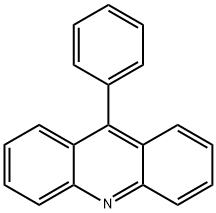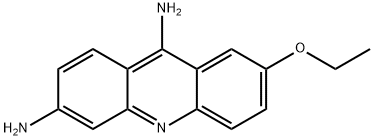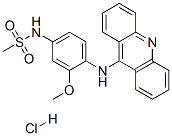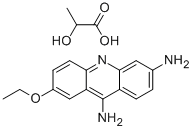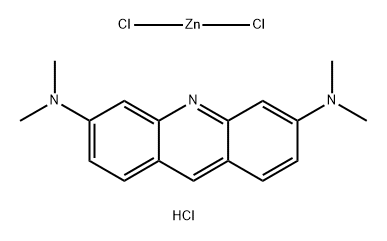PRODUCT Properties
| Melting point: | 184°C |
| Boiling point: | 388.54°C (rough estimate) |
| Density | 0.9418 (rough estimate) |
| refractive index | 1.6500 (estimate) |
| storage temp. | Sealed in dry,Room Temperature |
| form | powder to crystal |
| pka | 5.45±0.10(Predicted) |
| color | Light yellow to Amber to Dark green |
| InChI | InChI=1S/C19H13N/c1-2-8-14(9-3-1)19-15-10-4-6-12-17(15)20-18-13-7-5-11-16(18)19/h1-13H |
| InChIKey | MTRFEWTWIPAXLG-UHFFFAOYSA-N |
| SMILES | C1C2C(=NC3C(C=2C2=CC=CC=C2)=CC=CC=3)C=CC=1 |
| CAS DataBase Reference | 602-56-2(CAS DataBase Reference) |
| NIST Chemistry Reference | Acridine, 9-phenyl-(602-56-2) |
| EPA Substance Registry System | Acridine, 9-phenyl- (602-56-2) |
Description and Uses
9-Phenylacridine has antitumour activity. It can be used as a photosensitiser and can sensitise UVA-induced DNA damage in vitro and in cells. It also enhances cell killing by UVA. In addition. It is also used in photochemical research and as a raw material for organic synthesis.
Research has found that 9-phenylacridine (ACPH) exhibited anticancer activity in cell lines and in vivo animal models. Bioinformatics studies have indicated that it could have topoisomerase I inhibitory activity. It could also act as a PARP 1 inhibitor and was very effective in combination with cisplatin in cell line-based assays. ACPH also satisfied all criteria for a candidate drug from the Lipinski rule and showed good cell uptake. ACPH alone was effective in the A375 melanoma cell line. ACPH could be used as a promising new photosensitizer[1-2]. 9-Phenylacridine is the parent base of chrysaniline or 3,6-diamino-9- phenylacridine, the chief constituent of the dyestuff phosphine. It is commonly used in the electronics industry as a free radical photoinitiator, significantly improving photo speed.
Safety
| Symbol(GHS) |  GHS07 |
| Signal word | Warning |
| Hazard statements | H302-H315-H319-H335 |
| Precautionary statements | P261-P305+P351+P338 |
| Safety Statements | 22-24/25 |
| HS Code | 2933.99.8210 |

